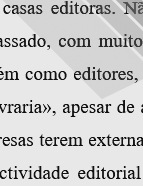

................................
Portucalense launched its activity in 1928 with the História de Portugal (1928-1937, in eight volumes), under the direction of Damião Peres. This would be the publisher's most important work, setting the tone for the following decades: an emphasis on historiographical publications and proximity to cultural nationalism, which was partly in line with the regime (highly important historians such as Jaime Cortesão and Newton de Macedo also collaborated in the História de Portugal). Damião Peres was also the most featured author in its catalogue, with more than two dozen works, including the História dos Descobrimentos Portugueses [History of the Portuguese Discoveries] and Como Nasceu Portugal [How Portugal was Born] (which reached its 7th edition in 1970); as well as prefaces and critical editions, such as the História Trágico-Marítima [The Tragic History of the Sea] by Bernardo Gomes de Brito, and the re-edition of the História da Igreja em Portugal [History of the Church in Portugal], by Fortunato Almeida, previously edited by the author. Another notable work was the História da Arte em Portugal [Art History in Portugal] (1942-1956, three volumes), by Reinaldo dos Santos, Mário Chicó and Aarão de Lacerda. Other published historians are also worthy of note, such as Paulo Merêa, Ruben Andresen Leitão and David Lopes, among the one hundred and fifty titles it was possible to collect (source: Porbase). Only a fraction of these titles do not focus on historical themes. In 1971, however, everything changed. That year, José Oliveira, then a student and far-left activist, inherited Portucalense and began publishing books of a political nature, mainly essays on left-wing themes and authors, such as Engels and Jacques Rancière, among others. Portucalense closed in 1972, possibly due to the fact that the publisher was forced to go underground. (F. Maués, Idem, 2019, pp. 232-235.)
The 1940s saw significant changes in the book sector. For example, a considerable number of new publishing houses emerged as a result of greater commercial dynamism. In addition to Cosmos, Portugália and Europa-América, the following were born: Editorial Inquérito (1938), Didáctica Editora (1944), Livros do Brasil (1944), Porto Editora (1944) and Editora Ulisseia (1946), among others. Some closed down after a few years while others survived the crisis at the end of the decade, gaining more prominence in the ensuing decades. The new figure of collection director also emerged, of which Bento de Jesus Caraça was a paradigmatic example at Cosmos. On a visual level, greater care was taken with the graphics and cover, and these innovations owed much to Ática and the journal Presença. Publishers boosted their professional representation with the Grémio Nacional dos Editores e Livreiros - which would publish the journal Livros de Portugal [Books of Portugal], targeting professionals in the sector. (N. Medeiros, Idem, 2010, pp. 131-138.)
